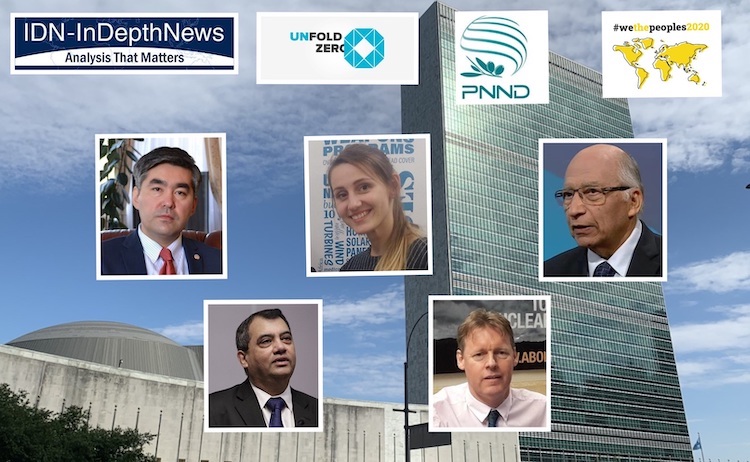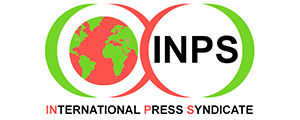
‘Target 2045: A New Rallying Call for Nuclear Weapons Elimination’ was the theme of a Webinar co-sponsored by the Basel Peace Office, IDN-InDepthNews, Parliamentarians for Nuclear Non-proliferation and Disarmament (PNND), UNFOLD ZERO and #wethepeoples2020 on November 2. It explored the political value of setting 2045, the 100th anniversary of the United Nations, as the target date by which the global elimination of nuclear weapons should be achieved, if not before.
Kazakhstan’s Permanent Representative to the United Nations in New York joined the call of civil society for achieving the global elimination of nuclear weapons at least by 2045. Setting the 2045 goal could provide a global rallying call to build a stronger movement that would leave no room for being dismissed as unrealistically early by those who rely on nuclear deterrence, they agreed. The discussions followed in the aftermath of Heads of State and Government Ministers addressing on October 2 a United Nations High-Level meeting on the elimination of nuclear weapons, along with the UN Secretary-General, the President of the UN General Assembly and two representatives of civil society associat,ed with the PNND.
Alyn Ware, Director of Basel Peace Office, World Future Council Member, and PNND Global Coordinator, chaired the Webinar. Speakers were: Ambassador Magzhan Ilyassov, Permanent Representative of Kazakhstan to the United Nations; Ramesh Jaura, Editor-in-Chief & Director-General, IDN-InDepth News, flagship agency of the non-profit International Press Syndicate group; Saber Chowdhury MP, Honorary President, Inter-Parliamentary Union (IPU), PNND Co-President; and Vanda Proskova, Vice-Chair, PragueVision Institute for Sustainable Security, and Co-chair, Abolition 2000 Youth Network.
As the Kazakh Ambassador pointed out, the 2045 proposal was introduced to the United Nations by Kazakhstan’s First President Nursultan Nazarbayev, first in a speech to the UN General Assembly in October 2015, and again when he hosted a special UN Security Council meeting on weapons of mass destruction in January 2018. President Nazarbayev appealed to the permanent members of the Security Council, in particular, to pledge to achieve the elimination of nuclear weapons by 2045.
“It was the decision of the First President of Kazakhstan to close the world’s second-largest test site and abandon the fourth largest nuclear arsenal, which gave impetus to the global nuclear test ban and the adoption of the Comprehensive Nuclear-Test-Ban Treaty, Ambassador Ilyassov pointed out.
Explaining IDN’s co-sponsorship of the Webinar, Ware emphasized the fact that a nuclear-weapons-free world is the agency’s central theme. The other dominant theme is sustainable development. In fact, the sixteenth of the 17 Sustainable Development Goals (SDGs) focuses on Peace and Justice, added Jaura.
He pointed out that the United Nations Office for Disarmament Affairs (UNODA) has worked out global norms for disarmament. These, according to UNODA, are vital to sustainable development, quality of life, and ultimately the survival of this planet, the crux of the SDGs.
The need for such norms obviously arises directly from the legacy of the last century plagued by wars and preparations for wars. The costs of such conflicts have been extraordinary. These have included not only the loss of untold millions of innocent civilians but also the annihilation of nature.
What is more: Weapons of mass destruction, along with excess stocks and illicit transfers of conventional arms, jeopardize international peace and security and other goals of the Charter of the United Nations, IPU’s Chowdhury and Prague Vision’s Proskova agreed.
Of course, disarmament alone will not produce world peace. Yet the elimination of weapons of mass destruction, illicit arms trafficking, and burgeoning weapons stockpiles would advance both peace and sustainable development goals.
It would accomplish this by reducing the effects of wars, eliminating some key incentives to new conflicts, and liberating resources to improve the lives of all the people and the natural environment in which they live.
Furthermore, disarmament will advance the self-interests, common security and ideals of everybody without discrimination.
Yet despite these benefits, disarmament continues to face difficult political and technical challenges. One such example is that the U.S. is exerting pressure on signatories to withdraw from some of the anti-nuclear treaties.
The U.S. administration has sent a letter to governments that have either signed or ratified the Nuclear Ban Treaty TPNW, telling them: “Although we recognise your sovereign right to ratify or accede to the TPNW, we believe that you have made a strategic error.”
The U.S. letter to TPNW signatories, obtained by The Associated Press, says the five original nuclear powers – the U.S., Russia, China, Britain and France – and America’s NATO allies “stand unified in our opposition to the potential repercussions” of the treaty.
It adds that the Treaty “turns back the clock on verification and disarmament and is dangerous” to the half-century-old Nuclear Nonproliferation Treaty, considered the cornerstone of global nonproliferation efforts.
Nearly two hundred experts in the field of nuclear disarmament and sustainable development participated in this global virtual forum. They commended Kazakhstan’s leadership and contribution to nuclear disarmament and expressed commitment to work together to achieve our collective aspiration for Global Zero. Ambassador Ilyassov underscored that in order to achieve a nuclear-weapons-free world by 2045, it is necessary to undertake the necessary action..
This view was supported by PNND’s Ware, IDN’s Jaura, IP’U’s Chowdhury and Prague Vision’s Proskova. They called for all the countries, NGOs, civil society and faith organisations, youth, activists, and media to join concerted efforts and flashlight that date of 2045 and make it known around the world. Chowdhury underlined what the parliaments were doing in that respect.
It’s not only the resistance to a nuclear-weapons-free world but also the lack of willingness to draw lessons from the COVID-19 pandemic. A simple lesson is; to take to a new normal — a new normal in which weapons of mass destruction including nuclear weapons have no place whatsoever, maintained Jaura.
Chowdhury emphasized the activities of parliamentarians in convincing their governments that the TPNW allows for a unique opportunity to invest funds in sustainable development projects for the benefit of their people and contribute to national, regional and international peace and security.
Together with Proskova, he emphasized the role of media and youth to join in creating awareness of the pressing need for global efforts to usher in a nuclear-weapons-free world. [IDN-InDepthNews – 05 November 2020]
Photo: Collage by Katsuhiro Asagiri, INPS-IDN, Multimedia Director.
Important link > First President Nazarbayev’s vision of a nuclear weapons-free world by 2045 endorsed in a global webinar

